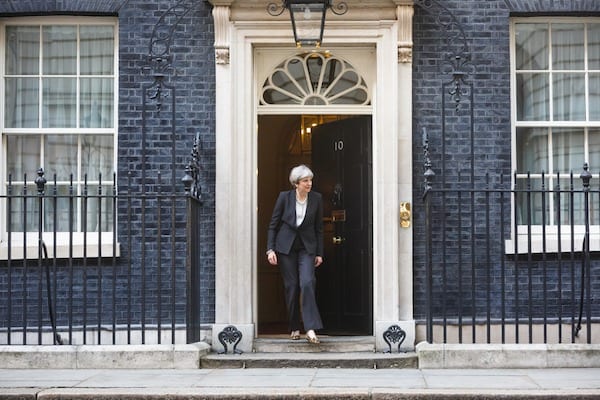She was speaking in the lead up to a major conference in the House of Commons today, which saw female MPs from more than 80 countries come together to discuss challenges for women in government, and how to better improve female representation.
“A parliament where women are a rare sight is a parliament working with one hand tied behind its back; a more representative parliament leads to better decision making, better politics and ultimately better government,” May told the group of international female MPs at a reception in Downing Street overnight.
She declared that a “woman’s place is in elected office” and spoke as the United States was expected to elect more than 100 women to the House for the first time.
They’re here! Nearly 100 #WomenMPsoftheWorld gather in London, getting to know each other before the conference in House of Commons tomorrow. They are #MakingHistory pic.twitter.com/1LEGN531cy
— Joanna Roper (@JoannaRoperFCO) November 7, 2018
May made the speech during a significant crunch period for the government she leads, with cabinet set to sign off on her Brexit negotiating plan in the coming days.
She said that women currently make up barely a quarter of the world’s nationally elected representatives. While we should not lose sight of how far we have come, there is still a long way to go.
“If we want to see that improve in our lifetimes, then it’s not enough to simply stand by and wait for change to happen. We have to make it happen. And I’m absolutely committed to doing just that.”
The speech was given just weeks before the 100th anniversary of women being able to stand for parliament in the UK, and the 99th anniversary of Nancy Astor becoming the first female MP in the House of Commons.
“Celebrating is something we should be doing this evening. Because today, 2018, we see more female members of parliaments and legislative assemblies around the world than there have ever been,” she said.
“And that is good news for all of the citizens we serve.”
But getting elected is only half the battle. “We also have to make the system work once we are a part of it – and doing so in what is often a male-dominated and male-oriented environment is not always easy,” she said.
“Together, we can overcome challenges, and can get on with what we got into this business to do: contributing to society, responding to the needs of local constituents and making a real difference to people’s lives.
May said that being able to “make a difference” that comes with being a member of parliament is what makes it the best job in world. “It’s a privilege we all enjoy, and one I’d like many more women and girls around the world to aspire to.
She said one of her proudest achievements as Home Secretary was passing the Modern Slavery Act. She also changed the law on parental leave as the Minister for Women and Equalities, enabling both parents to take on caring responsibilities for their child.
May was one of 13 female MPs when she first entered the Commons, today there are 67. She noted that her government is funding nationwide programmes aiming to get more women and girls interested in politics in the UK, while the Department for International Development is running programs in Sierra Leone, Nigeria and Pakistan to help give women a stronger voice in politics.
As #WomenMPsoftheWorld gather for this year’s historic conference in the UK Parliament, take a look at the key developments which have been made in women’s role in politics in the UK #WomenPowerPolitics report: https://t.co/poG6L8rBwW pic.twitter.com/NnCsbsRLG1
— theWPPproject (@theWPPproject) November 7, 2018
“Regardless of affiliation or ideology, let’s all work together, let’s learn from each other, let’s build the networks that will allow us to succeed,” she told the female MPs.
“And let’s make sure women and girls know that whatever their views, whatever their party, whatever others may say, a woman’s place is in elected office.”
Humbled to speak alongside inspiring female MPs from Ghana, Kenya, Tanzania and Kyrgyzstan ahead of the #WomenMPsOfTheWorld conference @DFID_UK Much has been achieved but we’ve still got a long way to go #Equality pic.twitter.com/ufsuPTAVgK
— Harriett Baldwin (@hbaldwin) November 7, 2018


